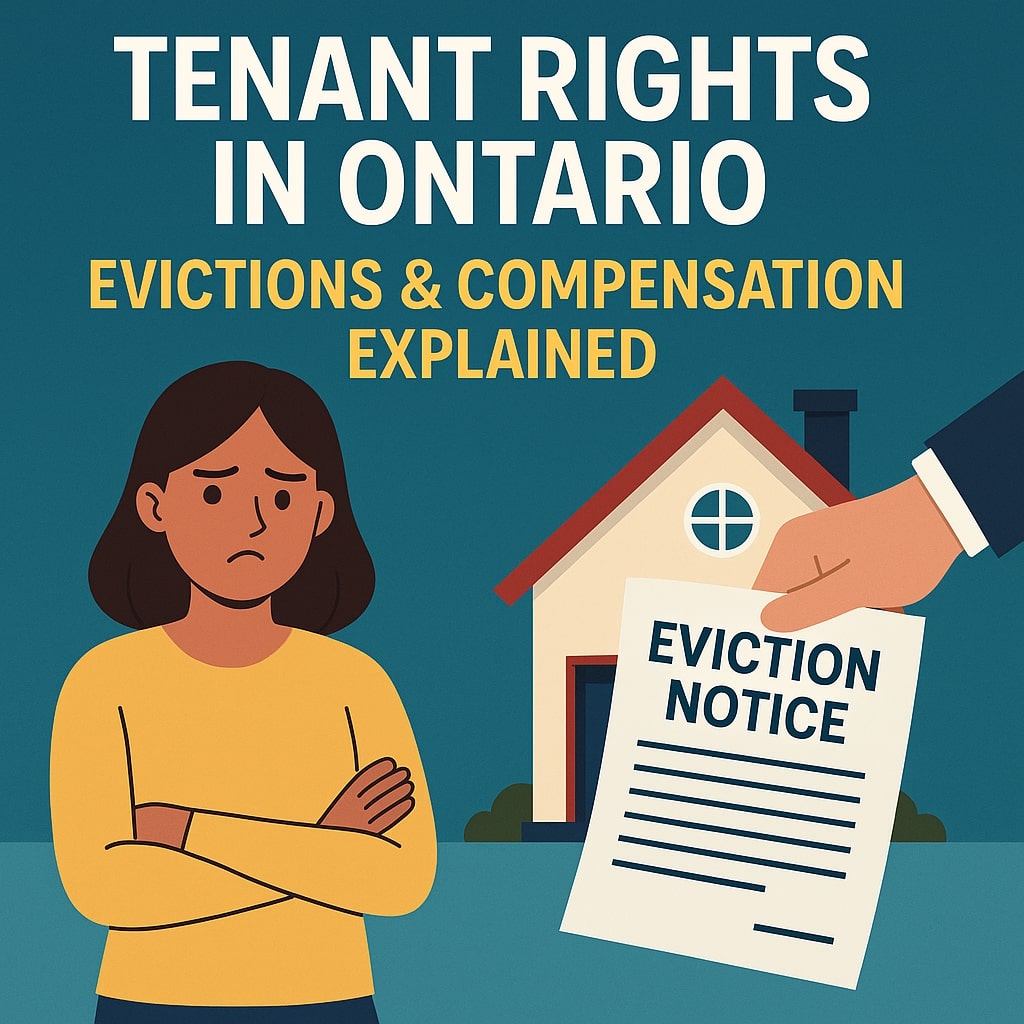Learn your rights as a tenant in Ontario when facing eviction — and how to claim potential compensation under Ontario’s landlord and tenant law.
📺 Watch this video first to understand how Ontario’s laws protect you if your landlord tries to evict you improperly:
Understanding Tenant Rights in Ontario
Tenants in Ontario are protected by the Residential Tenancies Act (RTA), a legal framework that governs most landlord-tenant relationships. One of the most misunderstood areas is eviction — particularly what happens when a landlord wants to remove a tenant after selling a rental property.
Too many Ontario tenants don’t realize they may be entitled to compensation or even allowed to stay in the unit. In many cases, landlords act in bad faith, hoping tenants won’t fight back or know their rights.
Can You Be Evicted If the Property Is Sold?
Short answer: No — not automatically.
If your landlord sells the property and the new buyer doesn’t intend to move in, you do not have to leave.
Even if the buyer signs a declaration claiming they’ll move in, your landlord still must compensate you either:
- At least 1 month’s rent
- Or offer you a comparable unit they own
What Is Bad Faith Eviction in Ontario?
A bad faith eviction occurs when a landlord falsely claims they or a buyer intends to move in — but later rents the unit out or flips it quickly. This is not only unethical, it may be illegal under the RTA.
Example:
A landlord serves a Form N12 notice claiming the buyer needs the unit. The tenant moves out. Weeks later, the unit is re-rented at a higher price. This is textbook bad faith, and the tenant may be eligible for significant compensation.
What Compensation Can Tenants Get?
Under Ontario law, if a landlord evicts you in bad faith, the Landlord and Tenant Board (LTB) can order them to pay you for:
- The difference in rent between your old and new unit (up to 12 months)
- Moving costs
- Damages or additional compensation in serious cases
Many tenants have been awarded 5 to 6 months of rent or more, depending on the circumstances.
How to Make a Claim to the LTB
If you’ve already moved out and suspect bad faith eviction, you can file a T5 application with the Landlord and Tenant Board.
To strengthen your case:
- Keep written records of communications
- Gather evidence showing the new owner never moved in
- Document your new rent amount and moving costs
⚠️ Please note: We do not provide legal advice, but we connect you with licensed Ontario paralegals who can help you understand your rights and assist with your claim.
When to Speak to a Paralegal
The laws around tenant evictions in Ontario are complex and time-sensitive. A good licensed paralegal can help you:
- Determine if your landlord acted in bad faith
- File paperwork correctly
- Represent you at the Landlord and Tenant Board
- Fight for the compensation you may be owed
📞 Call now to get connected with a licensed paralegal: [647-694-3726]
Or visit our Ontario Landlord and Tenant Law page for more info:
🔗 https://www.fighttraffictickets.ca/landlord-and-tenant-law/
Common Questions About Tenant Rights in Ontario
Can I refuse to move out if my landlord sells the house?
Yes — unless the new owner genuinely intends to live there. Even then, your landlord must give proper notice and compensation.
What if my landlord lied about needing the unit?
You may be eligible for compensation. Contact a paralegal to evaluate your case.
How much money can I get?
Each case varies, but tenants have received months of rent in compensation depending on the circumstances.
Final Thoughts
Ontario’s landlord-tenant laws are designed to protect renters from unfair or dishonest evictions. Unfortunately, many landlords take advantage of tenants who are unaware of their rights.
If you’ve been given a notice to vacate, don’t panic. Take a step back, learn your rights, and speak to a qualified legal professional who can guide you.
✅ Call 647-694-3726 today to get matched with a licensed paralegal who can help you with your potential case.

